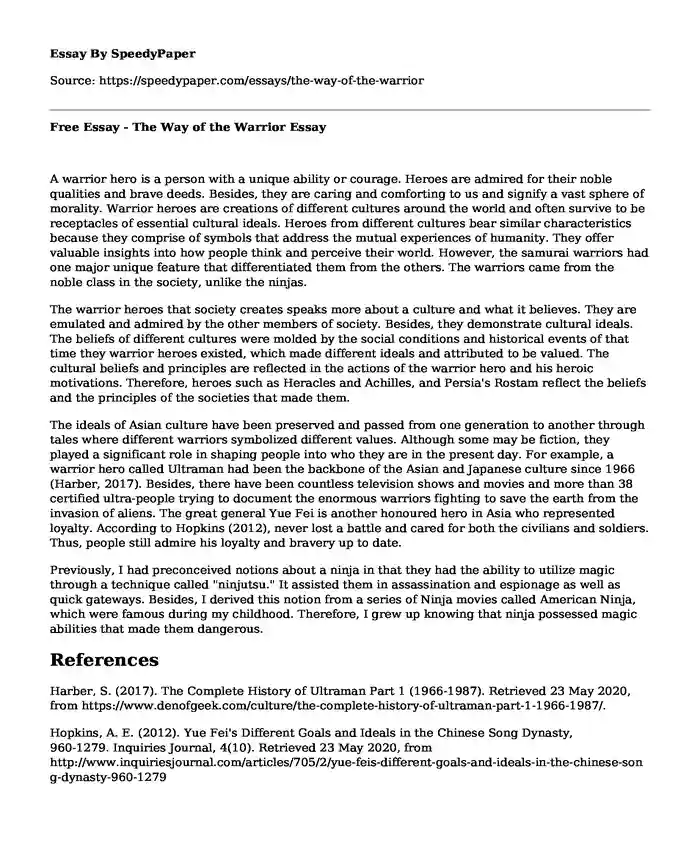A warrior hero is a person with a unique ability or courage. Heroes are admired for their noble qualities and brave deeds. Besides, they are caring and comforting to us and signify a vast sphere of morality. Warrior heroes are creations of different cultures around the world and often survive to be receptacles of essential cultural ideals. Heroes from different cultures bear similar characteristics because they comprise of symbols that address the mutual experiences of humanity. They offer valuable insights into how people think and perceive their world. However, the samurai warriors had one major unique feature that differentiated them from the others. The warriors came from the noble class in the society, unlike the ninjas.
The warrior heroes that society creates speaks more about a culture and what it believes. They are emulated and admired by the other members of society. Besides, they demonstrate cultural ideals. The beliefs of different cultures were molded by the social conditions and historical events of that time they warrior heroes existed, which made different ideals and attributed to be valued. The cultural beliefs and principles are reflected in the actions of the warrior hero and his heroic motivations. Therefore, heroes such as Heracles and Achilles, and Persia's Rostam reflect the beliefs and the principles of the societies that made them.
The ideals of Asian culture have been preserved and passed from one generation to another through tales where different warriors symbolized different values. Although some may be fiction, they played a significant role in shaping people into who they are in the present day. For example, a warrior hero called Ultraman had been the backbone of the Asian and Japanese culture since 1966 (Harber, 2017). Besides, there have been countless television shows and movies and more than 38 certified ultra-people trying to document the enormous warriors fighting to save the earth from the invasion of aliens. The great general Yue Fei is another honoured hero in Asia who represented loyalty. According to Hopkins (2012), never lost a battle and cared for both the civilians and soldiers. Thus, people still admire his loyalty and bravery up to date.
Previously, I had preconceived notions about a ninja in that they had the ability to utilize magic through a technique called "ninjutsu." It assisted them in assassination and espionage as well as quick gateways. Besides, I derived this notion from a series of Ninja movies called American Ninja, which were famous during my childhood. Therefore, I grew up knowing that ninja possessed magic abilities that made them dangerous.
References
Harber, S. (2017). The Complete History of Ultraman Part 1 (1966-1987). Retrieved 23 May 2020, from https://www.denofgeek.com/culture/the-complete-history-of-ultraman-part-1-1966-1987/.
Hopkins, A. E. (2012). Yue Fei's Different Goals and Ideals in the Chinese Song Dynasty, 960-1279. Inquiries Journal, 4(10). Retrieved 23 May 2020, from http://www.inquiriesjournal.com/articles/705/2/yue-feis-different-goals-and-ideals-in-the-chinese-song-dynasty-960-1279
Cite this page
Free Essay - The Way of the Warrior. (2023, Aug 03). Retrieved from https://speedypaper.net/essays/the-way-of-the-warrior
Request Removal
If you are the original author of this essay and no longer wish to have it published on the SpeedyPaper website, please click below to request its removal:
- An Introduction to Religious Tourism - Free Essay
- Book Review of The Conquest of the Incas by John Hemming, Free Essay
- "Destiny of the Republic" Essay Sample
- Benefits of Jackson's Action to the People. Free Essay
- Free Essay: Social Responsibility Post-Test
- Free Essay - The Way of the Warrior
- The Idea of Celibacy - Paper Example
Popular categories





